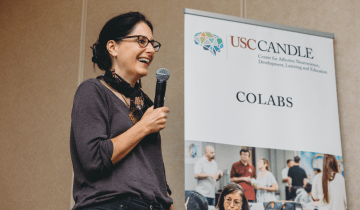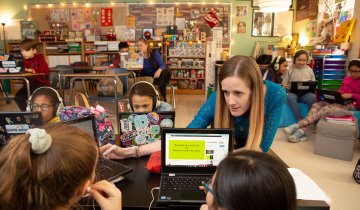If proof were needed that it’s a man’s world in the math-intensive scientific fields, consider the numbers. In 2016, the National Science Foundation found that, while women make up half of the college educated workforce in the United States, they hold just 29 percent of the science and engineering jobs, with the greatest disparities appearing in engineering, computer science and physical sciences.
USC Rossier Associate Professor Erika A. Patall thinks she knows a big reason why. She and a team of researchers collected data from high school students in physics, chemistry, engineering and biology. The students attended a variety of schools, many of which were Title I urban schools in Texas with high percentages of students from low-income families.
The researchers asked students to respond to a questionnaire each day after class for six weeks. Boys and girls — B students, on average, who were willing to participate in the study — were asked about their science teachers’ level of support for their needs as individuals and about how they felt in class each day. Did they feel engaged, motivated and satisfied? Were they bored? Did teachers invite their questions? Did teachers try to create activities that considered the students’ interests or see the learning experience from their point of view?

“What we see is that, on average, girls are less engaged in physics, chemistry and engineering classes than boys and perceive their teachers as providing less support for their motivation,” Patall said. The study did not find this to be the case in biology classes. “On the days when students perceived their teacher to have provided more autonomy support, they were more engaged.”
Motivation researchers use the term “autonomy support” to describe a teacher who considers the students’ perspectives and takes seriously the students’ questions and comments and their psychological needs.
Students of teachers who provide little autonomy support say they feel less motivated and competent; they ask fewer questions and enjoy the class less than students who feel supported by teachers.
“Undoubtedly, girls’ classroom experiences and motivational beliefs during high school play a critical role in predicting whether they persist in STEM fields into college,” Patall wrote in a paper titled “Motivational Gender Inequity in High School Science Classrooms.”
The study was funded by the William T. Grant Foundation.
Patall said students and teachers could all learn from the findings. Girls who ask questions in class or offer other input, even when they’re bored, might find themselves more engaged, which in turn leads to more supportive responses from teachers. “It brings about this cycle of being more engaged,” she said, “and facilitates greater interest and persistence in STEM.” Another strategy Patall suggests is to train teachers to adopt a mindset more supportive of student autonomy.
“If we want to encourage more girls to pursue math-intensive science fields like physics and engineering, educators are going to have to tap into girls’ existing interests and values and support their sense of autonomy during science class,” she said.





